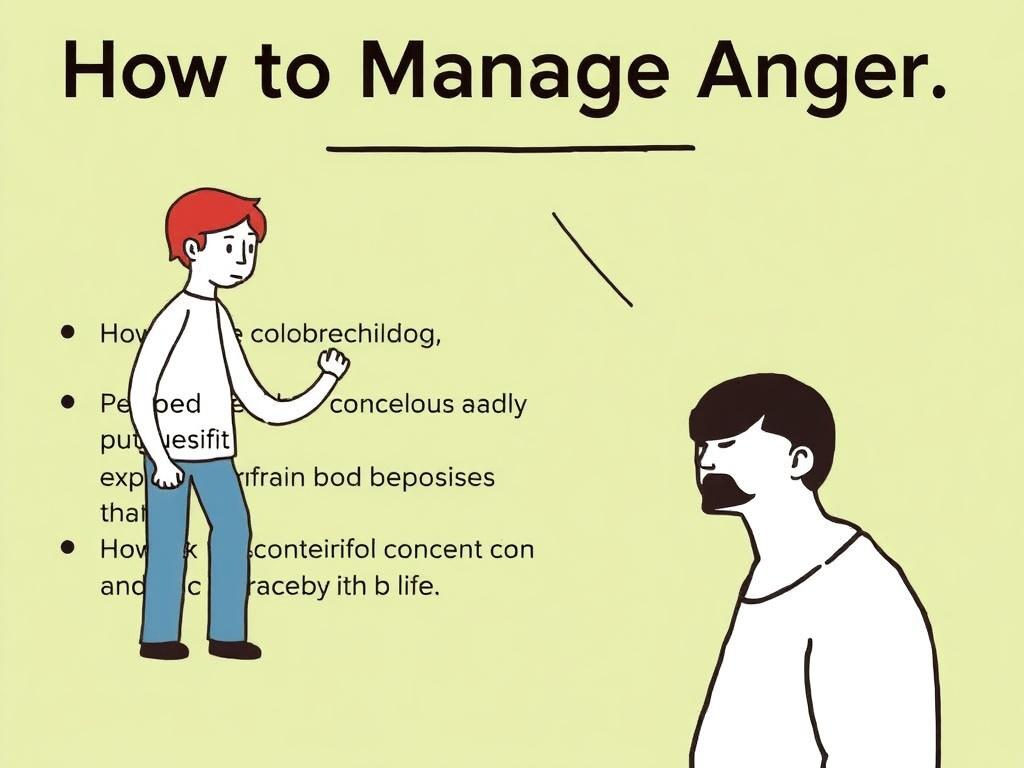Anger is a powerful emotion that everyone experiences from time to time. It’s natural to feel angry when things don’t go our way or when we face frustration, disappointment, or injustice. However, if anger is not managed properly, it can lead to negative consequences—damaged relationships, poor decision-making, and even health problems. Learning how to manage anger effectively is essential for maintaining emotional balance and living a healthier, happier life. In this article, we’ll explore some practical and proven strategies to help you understand your anger and keep it under control when it arises.
Understanding Anger: Why Do We Feel Angry?
Before diving into how to manage anger effectively, it’s important to understand the roots of this emotion. Anger is a natural response to perceived threats, injustice, or violation of personal boundaries. It can act as a signal, letting us know that something needs attention or change. However, uncontrolled anger can cloud judgment and lead to regrettable actions.
Our brains are wired to react quickly to threats—from minor irritations like traffic jams to more serious conflicts like arguments with loved ones. This fight-or-flight response triggers physical changes including increased heart rate, muscle tension, and adrenaline rushes. Recognizing these signs early can be your first step in managing anger before it escalates.
Common Triggers of Anger

Knowing the causes of your anger helps you prepare and respond better. Some common triggers include:
- Stressful situations at work or home
- Feeling misunderstood or disrespected
- Frustrations over unmet expectations
- Personal attacks or criticism
- Feeling powerless or out of control
- Physical discomfort, such as hunger or fatigue
When you identify your personal triggers, you can work toward reducing their impact or avoiding them when possible.
Effective Techniques to Manage Anger
Managing anger effectively involves a mix of immediate calming techniques and long-term lifestyle changes. Let’s explore both.
Immediate Strategies to Calm Down
When you feel anger rising, trying to soothe yourself in the moment can prevent escalation. Here are some ways to do that:
- Deep Breathing: Taking slow, deep breaths activates your parasympathetic nervous system, which helps calm the body. Try inhaling for 4 seconds, holding for 4, then exhaling for 4.
- Counting Backwards: Counting slowly from 100 downwards diverts your focus and helps cool down intense feelings.
- Take a Timeout: Step away from the provoking situation if possible. A short break can give you time to collect your thoughts.
- Use Positive Self-Talk: Replace angry thoughts with calming phrases such as “Stay calm” or “This will pass.”
Long-Term Strategies for Managing Anger Effectively
Beyond immediate calming techniques, fostering habits that reduce overall stress and reactivity is key to managing anger over time.
1. Practice Regular Physical Activity
Exercise releases endorphins, the body’s natural mood elevators. It also reduces levels of stress hormones like cortisol. Aim for moderate exercise such as walking, swimming, or yoga at least three times a week.
2. Develop Better Communication Skills
Sometimes anger arises from misunderstandings or poor communication. Learning to express feelings calmly and assertively can help resolve conflicts without hostility.
3. Identify and Change Negative Thought Patterns
Anger often stems from distorted thinking. Examples include “catastrophizing” or assuming the worst will happen. Try to challenge these thoughts and replace them with more balanced ones.
4. Build Problem-Solving Skills
If frustration comes from situations beyond your control, working on solutions actively reduces feelings of helplessness and builds confidence.
5. Prioritize Self-Care and Relaxation
Make time for activities that nurture your mental health—reading, meditation, hobbies, or socializing with supportive friends.
How to Use an Anger Management Plan
Creating a personalized anger management plan can help you prepare for anger-inducing situations before they occur. Here’s an example structure you could use:
| Step | Description | Example |
|---|---|---|
| Identify Triggers | List common situations or people that trigger your anger. | Being interrupted during conversations. |
| Recognize Warning Signs | Note physical and emotional signs indicating rising anger. | Clenched fists, increased heart rate. |
| Apply Calming Techniques | Use immediate strategies to cool down. | Deep breathing or stepping away. |
| Use Positive Communication | Express your feelings without blaming others. | “I feel upset when I’m interrupted because it feels disrespectful.” |
| Evaluate and Reflect | Afterward, review what worked and what didn’t. | Journaling about your reactions. |
Having a clear plan helps you feel more in control and ready to handle anger constructively.
Exploring Anger Management Therapy and Support
Sometimes, managing anger on your own can be challenging. In such cases, seeking the help of a professional anger management therapist or joining support groups can be highly beneficial. Therapy can offer:
- Personalized coping strategies
- Safe environment to explore underlying causes
- Techniques to improve emotional regulation
- Improved interpersonal skills
If you feel that your anger affects your work, relationships, or health, consulting a therapist or joining a structured program could be the right step.
Tips to Prevent Anger From Taking Over Your Day
Preventing anger means building resilience and reducing situations that provoke you. Here are some useful tips:
- Plan your day with enough time for tasks to reduce stress related to deadlines or rushing.
- Practice mindfulness meditation to increase present moment awareness and reduce impulsive reactions.
- Sleep well—lack of sleep can make you more irritable and reactive.
- Eat a balanced diet—low blood sugar can worsen mood swings and anger.
- Avoid excessive alcohol and drugs that impair judgment and emotional stability.
Common Myths About Anger That You Should Ignore
Understanding what anger management really means includes busting some common myths:
- Myth: Expressing anger is always bad.
- Fact: Anger is a normal emotion. The key is expressing it constructively, not suppressing it.
- Myth: People cannot change their anger habits.
- Fact: With practice and effort, people can learn how to control and reduce their anger.
- Myth: Anger management means never getting angry again.
- Fact: It’s about managing anger effectively, not eliminating it completely.
The Role of Emotional Intelligence in Managing Anger
Emotional intelligence (EI) plays a crucial role in managing anger effectively. EI is the ability to recognize, understand, and manage your own emotions as well as empathize with others. People with high EI tend to handle anger better because they:
- Are more aware of their emotional triggers
- Understand the underlying reasons for their anger
- Respond thoughtfully instead of reacting impulsively
- Connect better with others, reducing conflict
Developing emotional intelligence is a lifelong journey but can significantly enhance your ability to manage anger.
Technology and Apps That Help You Manage Anger
In today’s digital age, there are many helpful resources to assist you in managing anger. These include:
| App/Tool | Description | Key Features |
|---|---|---|
| Calm | Meditation and relaxation app | Guided meditations, breathing exercises, sleep stories |
| Headspace | Mindfulness and stress reduction | Mindfulness courses, mood tracking |
| Anger Management App | Designed specifically to track and manage anger | Identify triggers, log incidents, suggest coping techniques |
| Pacifica | Stress and anxiety relief | CBT-based tools, mood logging, guided relaxation |
Using technology can complement other anger management strategies by giving you on-the-go support.
How to Support a Loved One Struggling with Anger

If someone you care about struggles with anger, your support can make a big difference. Here are ways to help them:
- Encourage them to talk openly without judgment.
- Learn about anger management yourself to understand what they’re going through.
- Help identify triggers and calming strategies.
- Support their decision to seek professional help if needed.
- Practice patience and empathy rather than reacting defensively.
Being supportive can help your loved one feel more empowered to manage their anger effectively.
Signs It’s Time to Seek Professional Help
While many people manage anger without professional support, there are certain signs indicating it’s time to seek help:
- Frequent outbursts that harm relationships
- Physical aggression or violence
- Anger interfering with work or daily activities
- Experiencing feelings of guilt, shame, or depression related to anger
- Use of substances to cope with anger
If you or someone you know exhibits these signs, reaching out to a mental health professional can provide crucial assistance.
Summary Table: Quick Tips to Manage Anger Effectively
| Tip | Description |
|---|---|
| Recognize Triggers | Be aware of situations that inflame your anger. |
| Use Calming Techniques | Deep breathing, timeouts, positive self-talk. |
| Improve Communication | Express feelings calmly and assertively. |
| Practice Mindfulness | Stay present and avoid impulsive reactions. |
| Seek Support | Consult professionals or join groups if needed. |
| Exercise Regularly | Reduce stress through physical activity. |
| Practice Self-Care | Prioritize sleep, nutrition, and relaxation. |
Conclusion

Managing anger effectively is a vital skill that can improve your emotional well-being, relationships, and overall quality of life. By understanding what triggers your anger and learning practical strategies—from immediate calming techniques to long-term lifestyle changes—you can regain control over your emotions. Remember, anger itself is not bad; it’s how you respond to it that matters most. Whether through self-help techniques, professional support, or a combination of both, taking the time to manage your anger effectively is a meaningful investment in your mental and physical health. With patience, practice, and persistence, anyone can transform anger from a destructive force into a constructive signal for positive change.




















